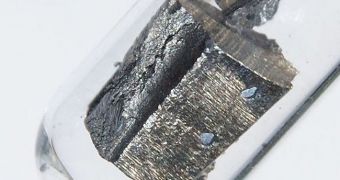Officials in Washington DC realized that the United States was nearly entirely dependent on China for supplies of critically-important rare-Earth elements, but they woke up too late; the Asian nation has just stopped exporting the minerals to America.
Market analysts reveal that China, which controls an estimated 90+ percent of the world market in this field, quietly stopped exporting the essential chemicals to the US and the European Union (EU).
The move comes one month after Beijing decided to halt REE exports to Japan as well, over a small territorial squabble in the South China Sea, The New York Times reports.
Experts are puzzled as to why China would initiate such embargoes, considering its already-tense trading relationships with the Western World.
According to anonymous sources from the Chinese REE industry, the embargo was set in place just hours after top officials in the country denounced the unfair trading practices of the United States.
In part, analysts believe, this situation is the fault of the developed world, which relied on China to pollute itself for extracting 95 percent of the world's REE supply.
Beijing took the bait, but then used the very inner mechanics of capitalism to force all other major producers out of business, essentially taking control of the global REE market.
As a direct result, it is currently beginning to leverage its impressive economical achievements to obtain what it wants, and there is little other countries can do about it.
Rare-Earth elements are critical components in a wide variety of high-tech products, ranging from common cellphones, laptops and other electronic devices to missiles, magnets and wind turbines.
In all fairness, Chinese actions seem justified from a multitude of perspectives. It caught a hole in the system, and then exploited it as much as it could.
In addition, its decision is also a retaliatory one, after the United States said that it is launching an investigation as to whether China was in violation of World Trade Organization (WTO) regulations that forbid subsidizing clean energy exports.
China may be doing so, US officials said, while at the same time discouraging imports, essentially forcing multinational corporations to produce more of their high-tech gear in the Asian nation.
Chinese Embassy spokesman Wang Baodong said this Tuesday that his country was only setting in place measures to limit the production, transport and export of REE.
“With stricter export mechanism gradually in place, outbound shipments to other countries might understandably begin to feel the effect,” Wang said in an email.
“But I don’t see any link between China’s reasonable rare earth export control policy and the irrational US decision of protectionist nature to investigate China’s clean energy industries,” he added.

 14 DAY TRIAL //
14 DAY TRIAL //